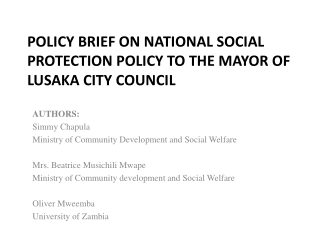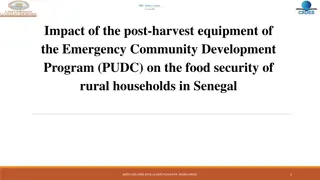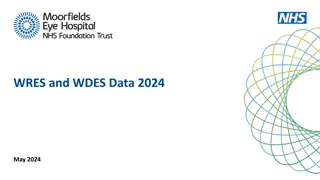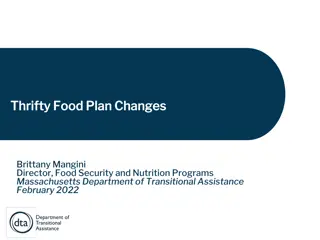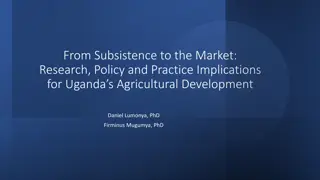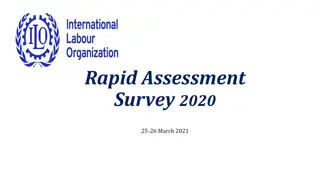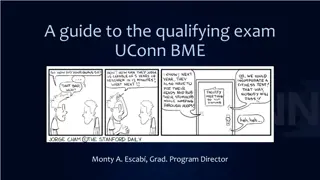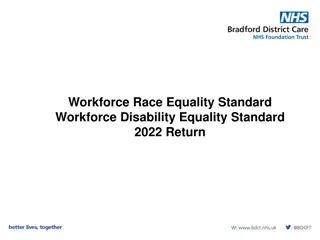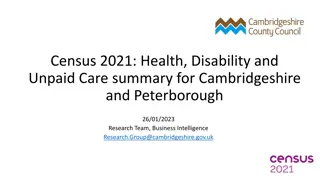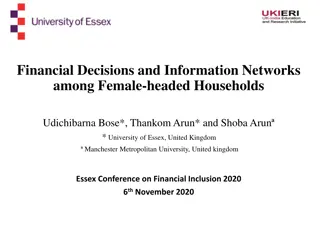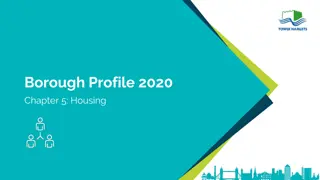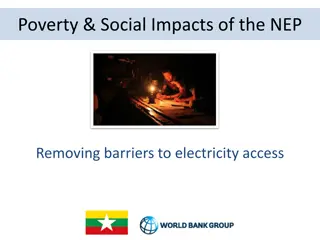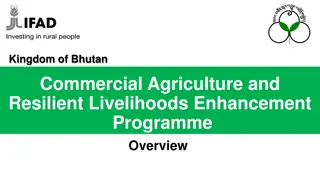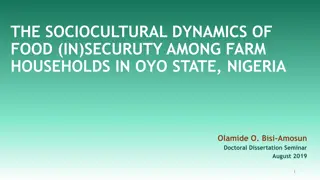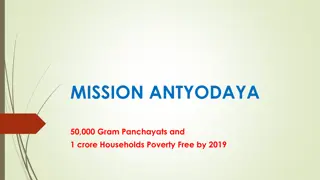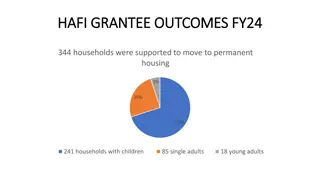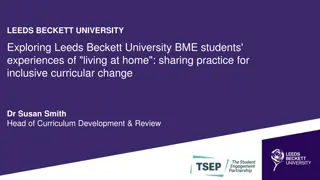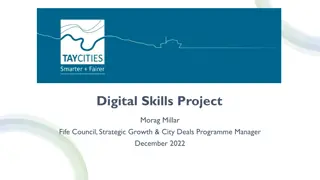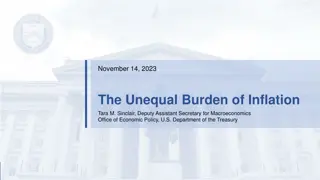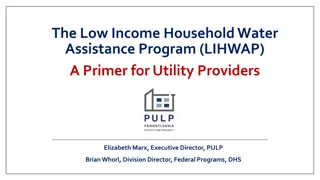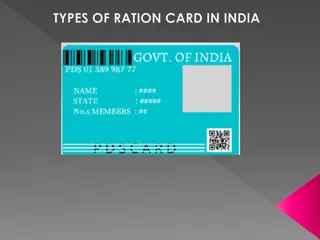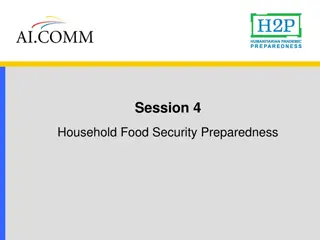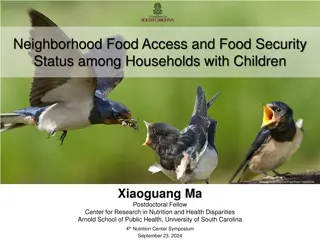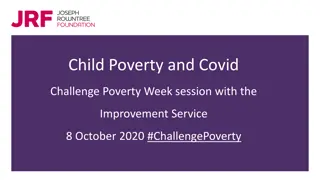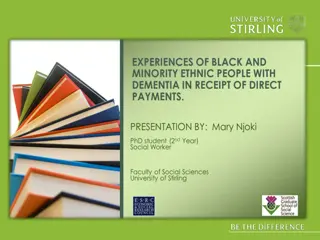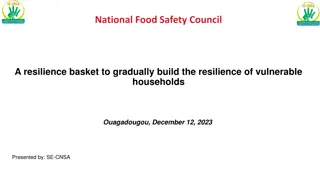Enhancing Social Protection Policy for Female-Headed Households in Lusaka
Persistent poverty among female-headed households in Lusaka necessitates a robust social protection policy aiming to alleviate poverty, improve access to basic services, and enhance overall well-being. The implementation of social cash transfer programs has shown promising results in uplifting vulne
0 views • 12 slides
Low Pay Household Estimates in Rural India
Analysis of data from the Periodic Labour Force Survey reveals estimates of households with monthly per capita earnings below a threshold in Rural India. The study, presented by Vasavi Bhatt, focuses on the characteristics of low earnings households and highlights the importance of decent work and i
1 views • 8 slides
Affordable Housing Solutions for Alameda County Communities
A-1 Community Housing Services, a non-profit HUD-approved agency, offers services such as first-time homebuyer education, rental counseling, and foreclosure prevention in California. With a focus on improving housing situations, they have assisted over 7000 households in various housing needs. Renta
1 views • 20 slides
Understanding the Circular Flow in a Three-Sector Economy
In a three-sector economy, the circular flow of income involves households, firms, and the government sector. The government acts as both a firm and a consumer, producing goods and services while also spending on consumption. The flow of income includes transfer payments, factor payments, taxes, sub
5 views • 5 slides
Chapter 10.Comparing Two Populations or Treatments
In a study of identical twins raised in high-income and low-income households, researchers compared IQ scores between the siblings. The analysis revealed that twins from high-income households had a higher mean IQ of 109.5 compared to 103.667 for those raised in low-income households. Although there
9 views • 52 slides
Association Between Friendship-Relative Network and Credit Borrowings in Indian Households
This study by Dr. Pallabi Chakraborty explores the impact of friendship-relative networks on borrowing from market lenders in Indian households. It examines the role of social connections in accessing formal and informal credit, and how these networks influence borrowing choices. The study aims to u
0 views • 14 slides
Impact of Post-Harvest Equipment in Senegal on Rural Food Security
The paper explores the impact of post-harvest equipment provided through the Emergency Community Development Program (PUDC) on food security in rural households in Senegal. It addresses the challenges of hunger and food insecurity, reviews the methodology, and discusses how PUDC aims to improve food
0 views • 25 slides
Diversity and Inclusion Insights in Workforce Data 2024
Explore the Workforce Race Equality Standard (WRES) and Workforce Disability Equality Standard (WDES) data for May 2024. The data provides insights into workforce diversity, representation, likelihood of appointments, disciplinary processes, training access, harassment experiences, and more, with a
2 views • 14 slides
Updated Thrifty Food Plan Improves SNAP Benefits for Massachusetts Residents
The Department of Transitional Assistance in Massachusetts has implemented changes to the Thrifty Food Plan (TFP) to enhance SNAP benefits for low-income households. The updated TFP reflects the latest Dietary Guidelines for Americans and aims to address barriers to food access faced by SNAP users.
0 views • 7 slides
Agricultural Development in Uganda: Transitioning from Subsistence to Market Economy
Uganda's agricultural sector plays a significant role in the economy, with a high percentage of households engaged in agriculture. However, many households are still trapped in subsistence farming, hindering overall GDP contribution. Disparities in poverty distribution across regions impact agricult
1 views • 25 slides
Impact of COVID-19 on Samoa: Rapid Assessment Survey 2020 Analysis
The Rapid Assessment Survey conducted in Samoa in March 2021 examined the impact of COVID-19 on the economy, employment, and households. The survey, funded by the ILO, provided critical insights into the challenges faced by businesses, employees, and households in Samoa. Key findings from the survey
2 views • 14 slides
Guide to Qualifying Exam at UConn BME Program
This guide outlines the importance of the Qualifying Exam as a rite of passage and a critical assessment of skills in written/oral communication, research project design, critical thinking, and more. It details the exam format, rubric, timeline, and key dates, providing insights into the NIH-style W
1 views • 9 slides
Energy Assistance Workshop Series Statewide Assessment
The Energy Assistance Workshop Series conducted a statewide assessment to understand energy burden and discuss utility energy assistance programs. The goal was to evaluate the effectiveness of mechanisms for energy assistance to prioritize households with higher energy burdens. The workshops aimed t
0 views • 26 slides
Workforce Equality Standards and Gap Analysis 2022
Workforce Equality Standards aim to provide insight into the experience and representation of disabled and BME staff within organizations, allowing for benchmarking and tracking progress. The Disability Equality Standard Results for 2022 show metrics related to the experiences of disabled staff comp
1 views • 6 slides
Understanding Circular Flow in a Two-Sector Economy with Financial Market
In a two-sector economy with a financial market, households and firms engage in savings, investments, and borrowing through the financial market, unlike the simple circular flow assumption where no savings are made. This interaction between households, firms, and the financial market plays a crucial
0 views • 4 slides
Insights from Census 2021: Health, Disability, and Unpaid Care in Cambridgeshire and Peterborough
Explore the key findings from the Census 2021 on general health, disability, and unpaid care in Cambridgeshire and Peterborough. Understand how individuals assess their health, the impact of disabilities on daily activities, and the provision of unpaid care within households. Gain insights into the
0 views • 32 slides
Financial Decisions and Information Networks in Female-Headed Households
Highlighting the challenges faced by female-headed households in making informed financial decisions, this study explores the impact of information networks such as media and social connections. It emphasizes the mediating role of financial expertise and aims to improve the financial behavior and ou
2 views • 19 slides
Equity, Diversity, and Inclusion Initiatives at University of Nottingham
The presentation highlights the importance of equity, diversity, and inclusion (EDI) at the University of Nottingham, addressing challenges such as BME attainment gaps, lack of diversity in senior roles, and issues of harassment and fairness. It emphasizes the need for a strategic approach to foster
0 views • 13 slides
Tower Hamlets Housing Profile and Challenges
The housing situation in Tower Hamlets presents significant challenges, with a high number of households on the waiting list and in temporary accommodation. Homelessness disproportionately affects younger residents, with specific reasons cited such as the end of shorthold tenancy and domestic violen
5 views • 11 slides
Somalia Off-Grid Solar Grant Facility Managed by International Bank of Somalia (IBS)
This grant facility, managed by International Bank of Somalia (IBS), aims to provide Off-Grid Solar solutions to households and businesses in Somalia. The facility seeks to address challenges such as lack of access to finance, low-quality products, and inadequate distribution infrastructure. With a
5 views • 13 slides
Implications of Climate Change on Food Security in Taraba South, Nigeria
Examining the implications of climate change on food security in rural farming households in Southern Taraba State, this study found high levels of food insecurity. Factors such as temperature, rainfall, and household characteristics were analyzed to understand the challenges faced by farming househ
0 views • 17 slides
Understanding Poverty and Social Impacts of National Electrification Program
Studying poverty and social impacts in the context of the National Electrification Program is crucial for identifying barriers to electricity access, understanding community perspectives, and ensuring inclusivity. Key observations highlight the challenges faced by poor households, emphasizing the ne
0 views • 12 slides
Enhancing Agricultural Resilience and Livelihoods in Bhutan
The Kingdom of Bhutan Commercial Agriculture and Resilient Livelihoods Enhancement Programme (CARLEP) aims to increase smallholder farmers' incomes and reduce poverty through climate-resilient agricultural production. CARLEP builds on IFAD's longstanding partnership with the Royal Government of Bhut
1 views • 19 slides
Millennial Avocado Shopper Trends: Growth Opportunities for Hass Avocados
This study focuses on identifying growth opportunities for Hass avocados by analyzing the purchase habits of Millennial avocado-purchasing households. Millennial households are found to be high-value segments in the avocado category, displaying behaviors that exceed those of Non-Millennial household
0 views • 15 slides
Sociocultural Dynamics of Food (In)security Among Farm Households in Oyo State, Nigeria
This doctoral dissertation seminar explores the sociocultural dynamics of food security among farm households in Oyo State, Nigeria. It delves into demographic characteristics, food production and consumption patterns, socio-cultural drivers of behaviors, and factors influencing food security. The s
0 views • 33 slides
Empowering Rural Communities for Poverty Alleviation and Sustainable Development
Empowering 50,000 Gram Panchayats and 1 crore households to become poverty-free by 2019 through initiatives focusing on landless manual workers, deprived households, and income doubling in rural areas. The efforts include enhancing agricultural productivity, market linkages, diversification of livel
0 views • 13 slides
Housing Assistance and Funding Outcomes FY24
In FY24, a total of 344 households received support to transition to permanent housing, with 241 households having children. Additionally, a mix of subsidized and market-rate housing types were provided, with 46% subsidized and 54% market rate. Grant funds totaling $210,000 were allocated towards fu
0 views • 4 slides
Addressing the Attainment Gap Among BME Students at Leeds Beckett University
Literature reveals a significant attainment gap between BME and White students at Leeds Beckett University, with teaching and learning experiences playing a crucial role. This study focuses on exploring and identifying factors affecting BME student achievement, using a mixed methods approach to anal
0 views • 28 slides
Fife Council Digital Skills Project for Regional Growth and Inclusion
Fife Council's Digital Skills Project, led by Morag Millar, aims to bridge the digital skills gap and enhance talent in the region. The project involves consultation with employers and providers to tailor courses, reduce course durations, and understand adult learners' needs. Objectives focus on mee
0 views • 7 slides
Understanding the Unequal Impact of Inflation on Different Socioeconomic Groups
Inflation affects different households unevenly, with poorer households experiencing faster price growth due to various factors like innovation and expenditure capabilities. The distributional effects are further influenced by economic recovery, leading to implications on real hourly wage growth and
0 views • 5 slides
Understanding Utility Affordability Challenges for Low-Income Households
Low-income households face significant challenges with utility affordability, especially during COVID-19. The lack of standardized affordability standards and the growing utility debts are exacerbating negative health outcomes and increasing the risk of eviction and homelessness for many families.
0 views • 37 slides
Types of Ration Cards in India and Their Benefits
In India, there are 5 types of ration cards - Priority Household (PHH), Antyodaya (AAY), APL (Above Poverty Line), BPL (Below Poverty Line), and AAY (Antyodaya). Each card serves a specific category of households, providing different amounts of food grain allocation per month. The PHH card is for el
0 views • 8 slides
Household Food Security Preparedness: Essential Tips for Pandemic Readiness
Understanding the critical importance of household preparedness for food security during a pandemic is key. With the potential for shortages and disruptions in income, it is vital for households to proactively take steps to secure food, water, and cash resources. Raising awareness through community
0 views • 23 slides
Exploring Neighborhood Food Access and Food Security Among Households with Children
This study delves into the correlation between perceptions of neighborhood food access and food security status among households with children. The research, conducted in the Midlands of South Carolina, aims to uncover associations between geographic access to food stores and food security status. B
0 views • 11 slides
Understanding the Impact of Child Poverty and Covid Challenges in Scotland
Figures and data reveal the concerning rates of poverty in Scotland, with various demographic groups facing higher risks. The Covid-19 pandemic has worsened the situation, leading to financial squeeze and decreased working hours. BME communities are particularly affected, experiencing discrimination
0 views • 15 slides
California Affordable Connectivity Program (ACP) Initiative Overview
The California Affordable Connectivity Program (ACP) aims to bridge the digital divide by providing eligible households with high-speed Internet services. This initiative offers assistance to low-income individuals through various eligibility requirements and identity verification processes. With fo
0 views • 20 slides
Understanding the Intersection of Dementia, BME Communities, and Direct Payments in Scotland
This project explores the effectiveness and cultural sensitivity of Direct Payments in meeting the challenges faced by BME individuals with dementia. Through research, it aims to amplify the voices of participants, inform policy-making, and advance scholarly debates on personalized support for BME d
0 views • 12 slides
Building Resilience for Vulnerable Households in West Africa
Addressing the challenge of food security in West Africa, the National Food Safety Council presents a strategic plan to gradually build the resilience of vulnerable households. The plan aims to improve food and nutritional security by empowering households and enhancing their productive capacities,
0 views • 17 slides
Developing Inclusive Freedom to Speak Up Approaches at Notts Healthcare NHS Trust
Embracing a culture of speaking up is crucial for fostering communication and addressing barriers in the workplace. The initiative at Notts Healthcare NHS Trust aims to empower staff to voice concerns and promote a supportive environment for feedback. Through sessions like Kindness, Civility & Respe
0 views • 21 slides
Integrated National Electrification Programme Overview
The Integrated National Electrification Programme (INEP) in South Africa has made significant progress in connecting over 5.8 million households to the grid between 1994 and February 2014. Additionally, more than 75,000 households have benefited from non-grid electricity, mainly through solar home s
0 views • 9 slides
